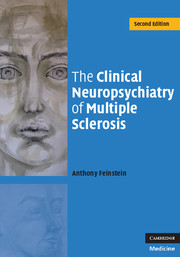Book contents
- Frontmatter
- Contents
- Acknowledgement
- Foreword
- 1 Multiple sclerosis: diagnosis and definitions
- 2 Depression: prevalence, symptoms, diagnosis and clinical correlates
- 3 Depression: etiology and treatment
- 4 Multiple sclerosis, bipolar affective disorder and euphoria
- 5 Multiple sclerosis and pseudobulbar affect
- 6 Multiple sclerosis and psychosis
- 7 Cognitive impairment in multiple sclerosis
- 8 The natural history of cognitive change in multiple sclerosis
- 9 Cognitive impairment in multiple sclerosis: detection, management and significance
- 10 Neuroimaging correlates of cognitive dysfunction
- 11 Multiple sclerosis, disease-modifying treatments and behavioral change
- 12 Multiple sclerosis: a subcortical, white matter dementia?
- Index
- Plate section
- References
5 - Multiple sclerosis and pseudobulbar affect
Published online by Cambridge University Press: 13 August 2009
- Frontmatter
- Contents
- Acknowledgement
- Foreword
- 1 Multiple sclerosis: diagnosis and definitions
- 2 Depression: prevalence, symptoms, diagnosis and clinical correlates
- 3 Depression: etiology and treatment
- 4 Multiple sclerosis, bipolar affective disorder and euphoria
- 5 Multiple sclerosis and pseudobulbar affect
- 6 Multiple sclerosis and psychosis
- 7 Cognitive impairment in multiple sclerosis
- 8 The natural history of cognitive change in multiple sclerosis
- 9 Cognitive impairment in multiple sclerosis: detection, management and significance
- 10 Neuroimaging correlates of cognitive dysfunction
- 11 Multiple sclerosis, disease-modifying treatments and behavioral change
- 12 Multiple sclerosis: a subcortical, white matter dementia?
- Index
- Plate section
- References
Summary
Pseudobulbar affect (PBA) has also been called pathological laughing and crying, emotional incontinence and excessive emotionalism. More recently, the term involuntary emotional expression disorder was coined (Cummings et al., 2006). In this chapter, for the sake of consistency and with an eye of historical verisimilitude, the syndrome will be referred to as PBA. It has been described with diverse neurological disorders, such as Alzheimer's disease (Starkstein et al., 1995), stroke (Morris et al., 1993), cerebral tumors (Monteil and Cohadon, 1996), amyotropic lateral sclerosis (Gallagher, 1989) and multiple sclerosis (Minden and Schiffer, 1990). Most of the research on PBA in MS was completed prior to 1970, and the studies are beset by problems with methodology. Of the five pre-1970 papers, only Cottrell and Wilson's (1926) frequently cited article was devoted exclusively to the topic, the remainder discussing PBA in the context of other mental state abnormalities occurring in MS.
Review of earlier studies
Cottrell and Wilson (1926) studied 100 patients with MS seen in a tertiary referral center. They developed a standardized interview of 44 questions probing the patient's mood, thoughts, somatic complaints and affect. By separating mood from affect, the authors made an important distinction between what patients felt and what they expressed, the two conditions not always being synonymous. The study contained a wealth of descriptive data, including demographic characteristics, the duration of neurological symptoms, and physical disability divided according to predominant system involvement (i.e. cerebellar, spinal, etc.).
Information
- Type
- Chapter
- Information
- The Clinical Neuropsychiatry of Multiple Sclerosis , pp. 82 - 98Publisher: Cambridge University PressPrint publication year: 2007
References
Accessibility standard: Unknown
Why this information is here
This section outlines the accessibility features of this content - including support for screen readers, full keyboard navigation and high-contrast display options. This may not be relevant for you.Accessibility Information
- 4
- Cited by
